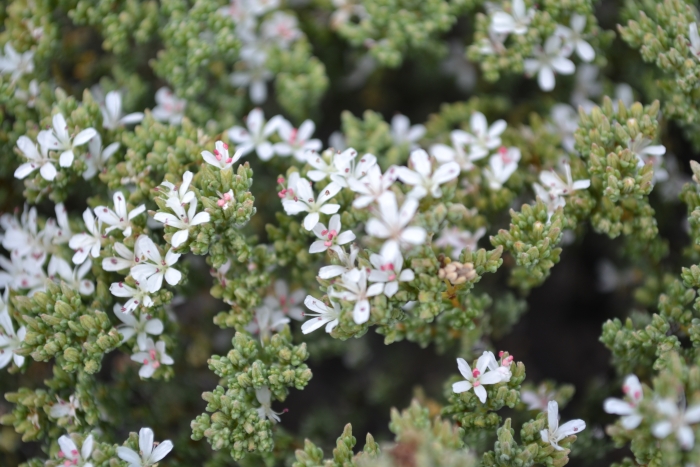Palmer’s Seaheath
(Frankenia palmeri)
Palmer’s Seaheath (Frankenia palmeri)
/
/

Lisa Cox, USFWS
CC BY 2.0
Image By:
Lisa Cox, USFWS
Recorded By:
Copyright:
CC BY 2.0
Copyright Notice:
Photo by: Lisa Cox, USFWS | License Type: CC BY 2.0 | License URL: https://creativecommons.org/licenses/by/2.0 | Uploader: Stickpen | Publisher: Wikimedia Commons | Title: Frankenia_palmeri.jpg |


















Estimated Native Range
Summary
Frankenia palmeri, commonly known as Palmer’s Seaheath, is an evergreen subshrub or shrub native to coastal sage scrub and chaparral habitats, as well as saline environments such as coastal marshes in Southern California and Northwest Mexico. It typically remains under 1 meter in height with a sprawling habit, featuring spreading stems that create a dense, tangled appearance. The leaves are small, fleshy, and knobby, adapted to conserve water in its arid native environment. During the spring and summer months, Palmer’s Seaheath produces delicate flowers with white petals, each about 3 to 4 millimeters long, that may have a pink hue near the throat, complemented by pink anthers, adding subtle color to its foliage.
Palmer’s Seaheath is valued for its drought tolerance and ability to thrive in saline soils, making it suitable for xeriscaping and coastal gardens. Its low water requirements and tolerance for full sun and fast-draining soils make it an excellent choice for low-maintenance landscapes. While not widely used, it can serve as an attractive ground cover or component of rock gardens. Due to its rarity in the wild, cultivating this plant can also contribute to its conservation. However, gardeners should be aware that it may be sensitive to overwatering and root rot in poorly drained soils.CC BY-SA 4.0
Palmer’s Seaheath is valued for its drought tolerance and ability to thrive in saline soils, making it suitable for xeriscaping and coastal gardens. Its low water requirements and tolerance for full sun and fast-draining soils make it an excellent choice for low-maintenance landscapes. While not widely used, it can serve as an attractive ground cover or component of rock gardens. Due to its rarity in the wild, cultivating this plant can also contribute to its conservation. However, gardeners should be aware that it may be sensitive to overwatering and root rot in poorly drained soils.CC BY-SA 4.0
Plant Description
- Plant Type: Subshrub, Shrub
- Height: 1-2.5 feet
- Width: 0.4-1 feet
- Growth Rate: Moderate
- Flower Color: Pink, White
- Flowering Season: Spring, Summer
- Leaf Retention: Evergreen
Growth Requirements
- Sun: Full Sun
- Water: Low
- Drainage: Fast
Common Uses
Bee Garden, Bird Garden, Butterfly Garden, Drought Tolerant, Low Maintenance
Natural Habitat
native to coastal sage scrub and chaparral habitats, as well as saline environments such as coastal marshes in Southern California and Northwest Mexico
Other Names
Common Names: Palmer’s Frankenia, Yerba Reuma
Scientific Names: , Frankenia palmeri,
GBIF Accepted Name: Frankenia palmeri S.Watson